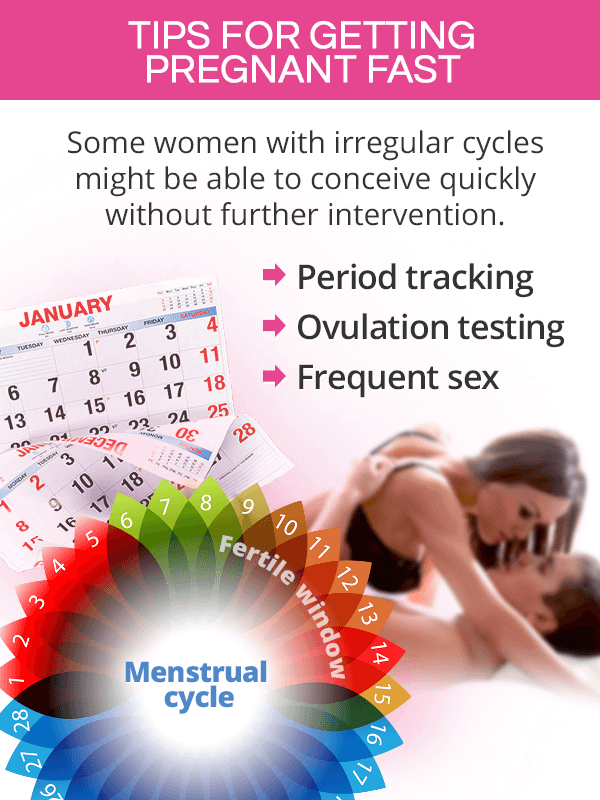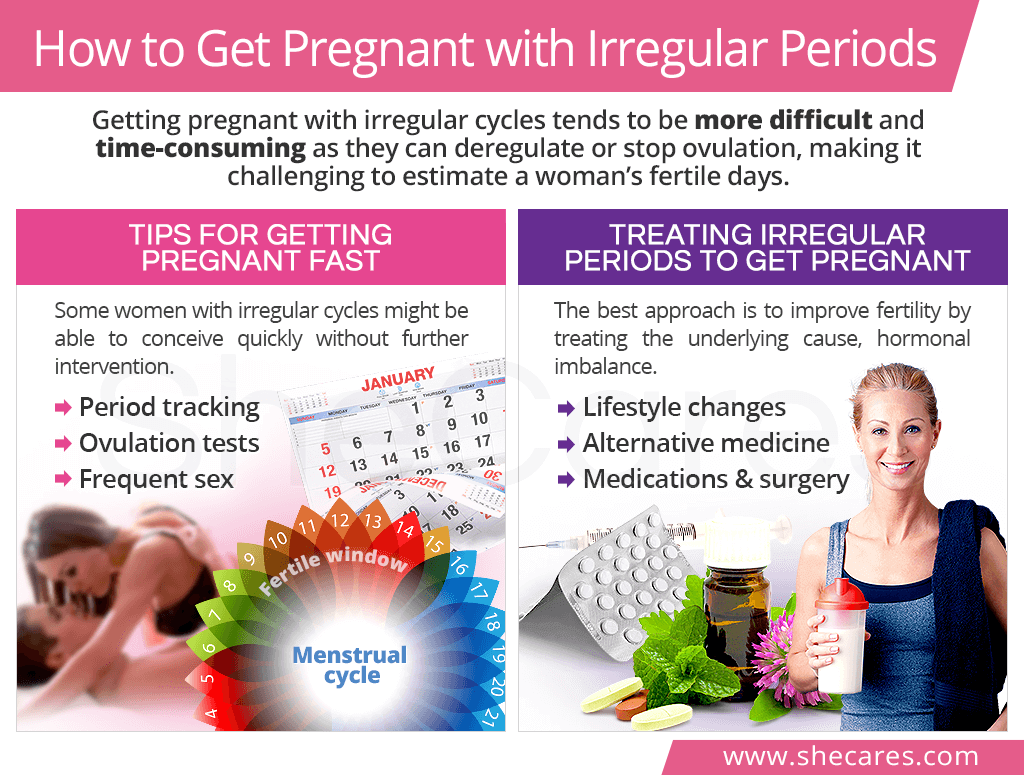What are Irregular Periods?
Irregular periods refer to menstrual cycles that fall outside the normal range, which is 21 to 35 days. They might also consist of heavy bleeding or painful menses.
A woman with irregular menstruation might not be ovulating regularly, a condition called oligoovulation, or she might not be ovulating at all, which is referred to as anovulation. In both cases, getting pregnant becomes more challenging.
Causes of Irregular Periods
The most common underlying cause of irregular menses is a hormonal imbalance of estrogen and progesterone, which might be brought about by various conditions, including:
- Polycystic ovary syndrome (PCOS)
- Endometriosis
- Insufficient or excess body fat percentage
- Thyroid disease
- Uterine fibroids
- Nutritional deficiencies
- Stress
- Perimenopause
Tips for Getting Pregnant Fast with Irregular Periods

Although it is possible for women with irregular periods to get pregnant on their own without extensive preparations, it usually takes much longer to conceive than for those who implement concrete steps towards optimizing their efforts.
The best tips on how to get pregnant fast with irregular periods include the following:
Period Tracking
For women with the intention of getting pregnant with irregular periods, it is beneficial to track periods as they are a good reflection of the body's overall health, particularly hormonal balance.
Numerous period trackers are widely available in various forms to fit personal preference and lifestyle, from printable calendars to digital applications. Taking note of the dates menstrual bleedings begin and end for at least three months will be of tremendous help when trying to estimate ovulation to get pregnant or consulting with a doctor.
Ovulation Predictions
Since irregular periods come without a pattern, it is difficult to predict them. As such, it is more beneficial for women to use ovulation tests to detect the body's cues that ovulation is under way and narrow down the most fertile days.
Tests that can read body signs that a woman is entering the fertile period come in two types:
Self-assessment ovulation tests include measuring basal body temperature, checking cervical mucus, and checking cervical position. They work by recording physiological changes in the body that occur as the hormones fluctuate in preparation for ovulation.
At-home ovulation tests consist of store-bought tools to estimate egg release, such as ovulation test kits or ovulation microscopes. They work by detecting natural hormonal changes in the urine or saliva preceding ovulation.
Frequent Sex
Generally, timing intercourse with a woman's fertile window is the best way to get pregnant fast and easy. It extends five days before ovulation and on the day of, during which the sperm can survive inside the women's body awaiting egg release and fertilization.
However, for women with irregular periods, it is better to have regular sex throughout the month, which means being intimate two to three times a week. This heightens the likelihood of hitting the fertile window even without knowing when exactly it occurs. Various sex positions to get pregnant might make intimacy even more appealing and productive.
Treating Irregular Periods and Trying to Conceive

The best solution to how to get pregnant with irregular periods is taking the time to find the appropriate treatment to regulate cycles, thus increasing the chances of conception and lowering the risk of pregnancy complications.
Although the specific approach will hugely depend on the underlying cause, irregular period treatments might include the following:
Lifestyle Changes
Because irregular periods might result from poor nutrition, prolonged stress, or unhealthy weight, addressing these gaps can be enough to normalize the menstrual cycle and improve ovulation. Good approaches improving the odds of getting pregnant with irregular cycles include:
Fertility diet can not only provide the necessary nutrients, like iron, for the proper functioning of the female reproductive system, but it can also help women achieve optimal weight that promotes successful conception.
Fertility exercise that is kept at a moderate level and includes aerobic and muscle-strengthening components can decrease cortisol levels affecting periods and help women attain a normal body mass index (BMI).
Alternative therapies for fertility reduce the inhibitory effects of prolonged stress on menstruation. Through acupuncture, meditation, or yoga, a woman can release stress for happier and more peaceful baby-making.
Alternative Medicine
Numerous herbs make for effective fertility supplements that can promptly bring regularity to a woman's menses by resolving the underlying hormonal imbalance. They include:
Phytoestrogenic herbal supplements, such as chaste berry or red clover, contain phytoestrogens, which work similarly to the body's estrogen, thus balancing its levels and regulating menstruation. However, their long-term use can trigger the body to stop its own hormone production, leading to further imbalance.
Hormone-regulating supplements, like Macafem, are considered some of the safest and most effective herbal supplements as they do not introduce any outside hormones into the body. Instead, they stimulate the endocrine system to regulate its own hormonal production for ultimate balance and healthy periods.
Conventional Medicine
In some cases, the aforementioned approaches might be complemented with pharmaceutical or surgical approaches to getting pregnant with irregular periods.
Ovulation-stimulating medications, including fertility pills and injections, can be beneficial for women whose irregular periods occur with ovulation problems.
Surgery might be necessary to remove uterine fibroids or polyps causing abnormal menstruation and restore healthy cycles.
Key Takeaways
Although getting pregnant with irregular periods naturally is possible for many women, it is likely to take longer and be more nerve-wracking. The main issue behind irregular cycles concerns ovulation because they might deregulate or stop monthly egg releases. Simple solutions to how to get pregnant fast with irregular periods can involve tracking one's periods to understand their patterns, using ovulation tests to narrow down the fertile window, and having regular intercourse to increase the odds of conceiving.
However, a better approach to getting pregnant with irregular cycles consists of treating the underlying cause of irregular periods, which most commonly is hormonal imbalance. Implementing lifestyle changes, like a fertility diet or exercise, along with alternative medicine of phytoestrogenic supplements, like vitex chasteberry, or hormone-regulating supplements, like Macafem, can greatly decrease the need for conventional treatments and help women achieve menstrual regularity and healthy pregnancies.
Sources
- American Pregnancy Association. (2018). Track Ovulation With Irregular Periods. Retrieved March 12, 2019 from https://americanpregnancy.org/getting-pregnant/track-ovulation-irregular-periods/
- Cleveland Clinic. (2015). Abnormal Menstruation (Periods) Management and Treatment. Retrieved March 12, 2019 from https://my.clevelandclinic.org/health/diseases/14633-abnormal-menstruation-periods/management-and-treatment
- Health Direct. (2017). Irregular periods. Retrieved March 12, 2019 from https://www.healthdirect.gov.au/irregular-periods
- Office on Women's Health. (2018). Pregnancy tests. Retrieved March 12, 2019 from https://www.womenshealth.gov/a-z-topics/pregnancy-tests
- University of Rochester Medical Center. (n.d.). Ovulation Date Calculator. Retrieved March 12, 2019 from https://www.urmc.rochester.edu/encyclopedia/content.aspx?ContentTypeID=41&ContentID=OvulationCalc


